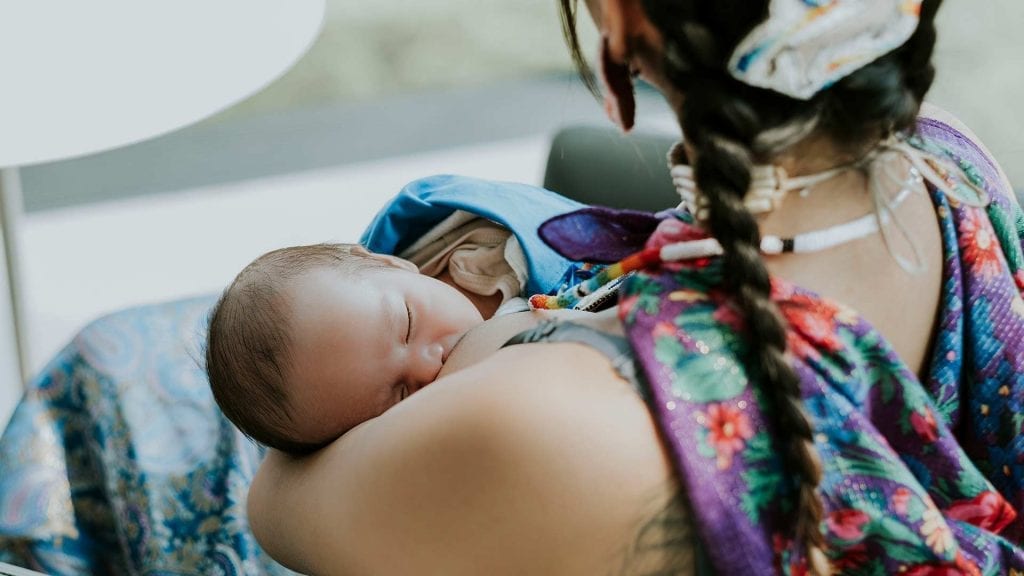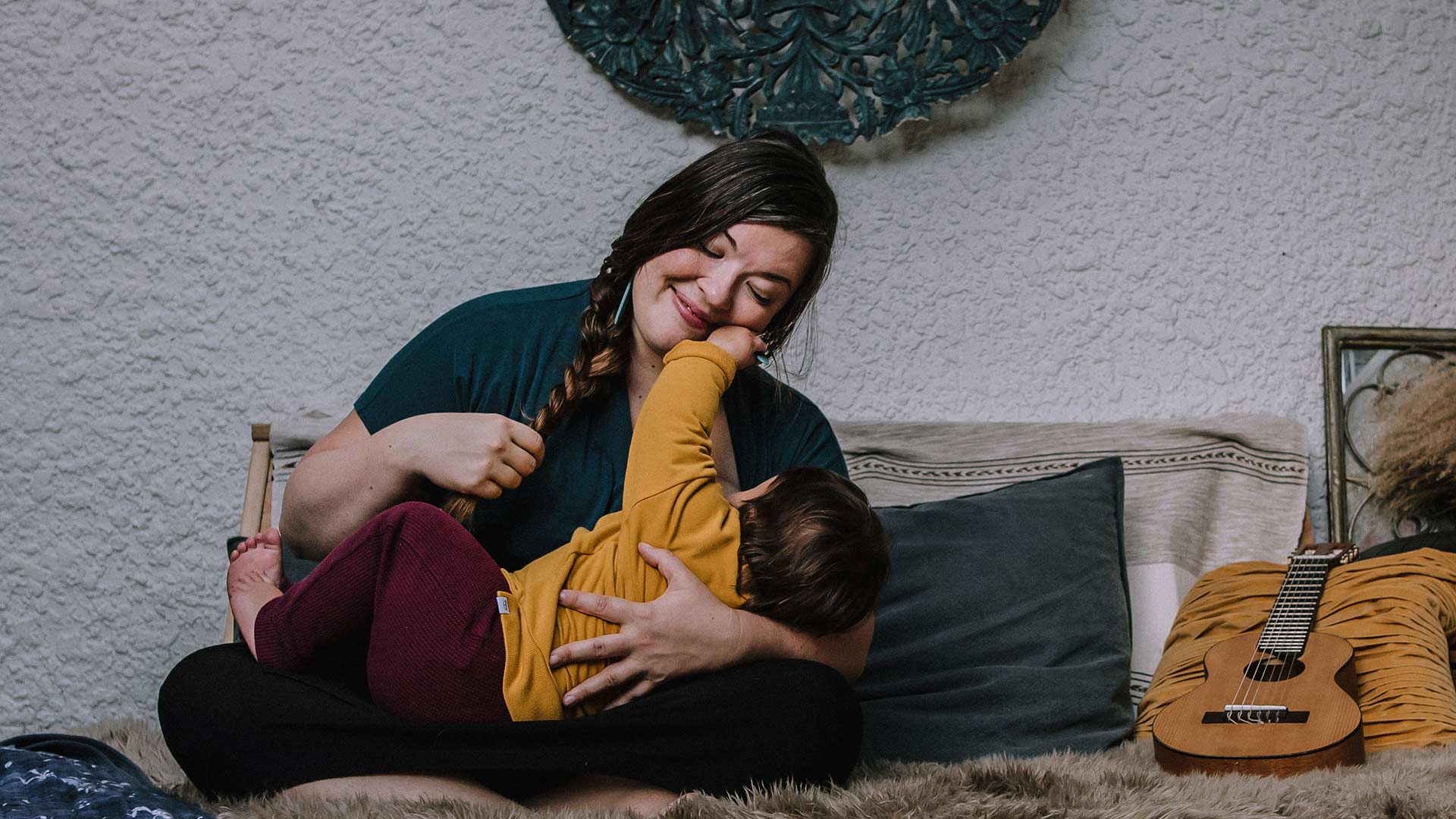
After breathing, breastfeeding offers a significant developmental milestone says Aiden Farrow and it's important not to break that bond. Photo by Elicia Munro Photography
Jessie Hemphill, from the Gwa’sala-‘Nakwaxda’xw Nations, is a first time parent of 18 month-old Ida, named after her grandmother and great grandmother.
For Hemphill, breastfeeding happened fairly easy, but she says she understands that’s not always the case.
“Breastfeeding is so much harder than you would expect,” Hemphill says. “Those first few days or weeks, as my body got used to it, were a big struggle but at the same time, the connection was so profound. I was so happy that I was able to feed her.”
Even now, at 18 months, Ida still nurses to get to sleep every night, Hemphill explains, and through the day to keep the connection going.
Hemphill says she couldn’t imagine not being able to breastfeed her baby.
“The depth of pain and grief that would come from being separated from your baby when you wanted to breastfeed, to not be able to do that, must feel like death,” she says. “It’s one of the most horrific punishments I can think of imposing on a mother and especially the child.”
Breastfeeding is a fundamental part of how a new person comes into the world, Hemphill says.
Not all mothers get the opportunity
Aiden Farrow is a lactation consultant who works to help maintain the breastfeeding bond between birthing parents and apprehended infants.
“A large number of the children in our program are in foster care, many removed soon after birth and this is obviously a huge barrier to breastfeeding,” Farrow says. They work for the Victoria Native Friendship Centre, as a lactation and infant feeding consultant, with newborns and children under the age of six.
Farrow came into the lactation consultant role with over ten years of experience supporting breastfeeding parents and their babies.
“I have a special interest in helping babies achieve one of their first developmental milestones, which, after breathing, is breastfeeding,” Farrow says.
The right for a mother to breastfeed her baby should be upheld in the same way harvesting rights and traditional foods are protected, Farrow argues.
“Human milk provides all the food and water a baby needs in their first six months of life and continues to be an important part of their diet until age two or beyond,” Farrow says. “Breastfeeding is a traditional food that should be protected.”

Farrow works at the Victoria Native Friendship Centre and specializes in working with apprehended infants while searching for more resources on how to maintain the breastfeeding bond, despite separation.
Breastfeeding can be really difficult for new parents, in many different ways — from the judgement others impose in public spaces, to the baby having trouble latching, Farrow says.
For Indigenous Peoples, mothers, Two-spirit, transgender, or gender diverse peoples, this experience can be even more difficult because of the impacts of colonization, systemic racism, and a loss of connection to traditional breastfeeding and birthing practices.
“Child removal interrupts social, cultural, and emotional bonds between parents, their children, and their Indigenous heritage. Supporting breastfeeding for babies in care needs to take a holistic view of what child removal means to the baby, the mother or parent, the family and the community,” says Farrow.
‘Child removal interrupts bonds’
The Representative for Children and Youth (RCY), in B.C., together with the Ministry of Children and Family Development (MCFD), published a joint report in 2018 called Promoting Access to Breastfeeding in Child Welfare Matters.
The report, which examines policies and practices to enhance and support access to breastfeeding, came after the B.C. Supreme Court ruled in favour of an Indigenous mother whose baby was removed from her care by MCFD three days after birth.
In this particular case, the community’s lawyer petitioned for the mother to have daily access to her baby for breastfeeding and bonding. Soon after, the court ordered MCFD to return the baby to the mother’s care.
In the report, MCFD committed to producing guidelines for social workers regarding breastfeeding after child removal.
Until those guidelines are established, social workers make decisions about breastfeeding babies who are in care, often without proper guidance, Farrow says.
Read More:
B.C. ends birth alerts but families question what it means for babies already in care
The removal of children from their families can be devastating in more ways than one.
“Child removal interrupts social, cultural, and emotional bonds between parents and their children and their Indigenous heritage. Indigenous children are grossly overrepresented in the care system in BC, removed primarily from their families for issues related to poverty,” Farrow says.
Consistent with the United Nations Declaration on the Rights of Indigenous Peoples (UNDRIP) and Bill C92: An Act respecting First Nations, Inuit and Métis children, youth and families, Farrow believes child removal should be the “last resort.”
A baby or child should have access to their family and community, as much as possible, Farrow says.
“Allowing for breastfeeding is part of that,” he says. “Giving the mother or parent a breast pump without adequate emotional support and little time with the baby at supervised visits in ministry office spaces, or busy playgroups, doesn’t create adequate conditions for parental bonding and successful breastfeeding.”
Farrow wants to see social workers and parent support workers strategizing together on ways to help protect the important breastfeeding bond between parent and child.
A sacred connection

According to Hemphil, “there’s such a feeling of power that my body, this mother body, is able to produce the food that nourishes my baby, even after she’s come out of the womb.
“To continue to provide for her that way made me feel powerful and connected, and just feels like such a universal experience, or near universal experience, that generations of women in my family experienced.”
There was a time when breastfeeding in public was shamed, but Hemphill says that she hasn’t felt public pushback. In fact, she says she was supported in her workplace.
Hemphill, who lives in Cowichan, is an instructor at UBC and Vancouver Island University, and has brought her baby to work with her and nursed her while lecturing.
“There’s something about breastfeeding and the way that it connects our own well being so directly to our children. The better I take care of myself the better I am able to take care of my little one,” says Hemphill. “I just wish that any person that wishes to breastfeed their child, it’s important for them to have the right to do so.”
Our series on reproductive health access is made possible in part with funding from First Nations Health Authority (FNHA) and Thunderbird Partnership Foundation. Their support does not imply endorsement of or influence over the content produced.











